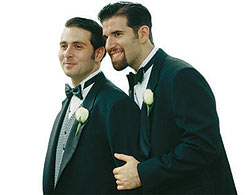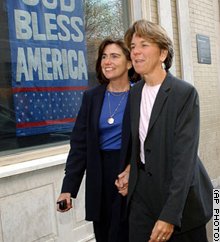Part 2: Gay Marriage
 Marriage laws are not federal. Each state has always been free to determine its own laws concerning marriage. The first major legal case involving gay marriage occurred in Hawaii in 1993. At that time the Hawaii Supreme Court ruled that the state could not prohibit same-sex marriages without providing a "compelling reason." Shortly after, courts in Alaska reached the same conclusion. The legislatures of both states responded to the courts by pushing through amendments to their state constitutions which prohibited all gay marriages. Since then 37 states have enacted a ban on gay marriages in some form.
Marriage laws are not federal. Each state has always been free to determine its own laws concerning marriage. The first major legal case involving gay marriage occurred in Hawaii in 1993. At that time the Hawaii Supreme Court ruled that the state could not prohibit same-sex marriages without providing a "compelling reason." Shortly after, courts in Alaska reached the same conclusion. The legislatures of both states responded to the courts by pushing through amendments to their state constitutions which prohibited all gay marriages. Since then 37 states have enacted a ban on gay marriages in some form.
In addition, congress passed the "defense of marriage act" (DOMA) in 1996. DOMA sought to accomplish two things. First, DOMA prevents the federal government from recognizing any gay marriage by defining marriage as between one man and one woman. This would allow that a gay couple could be married under state law but the federal government would not recognize the existence of a marriage. Second, DOMA provides a shield allowing a state to refuse to recognize a gay marriage from another state. Traditionally, if one is married in state X, then state Y will recognize the marriage even if the two states' laws differ. DOMA means that a gay marriage today is only valid in the state that allowed it. Neither the federal government nor other states are required to recognize the marriage.
Why doesn't DOMA resolve the gay marriage issue? Because it is not clear that DOMA is constitutional. In other words, there is a concern that the Supreme Court could rule that DOMA is unconstitutional and, if that were to happen, then all states (and the federal government) would have to recognize gay marriages if even a single state allows them (and one does). This has led many states to place prohibitions on gay marriage in their state constitution to ensure that no state court could rule in favor of gay marriages.
Though many states have taken steps to ban gay marriage, some have opted for civil unions as a way to grant gay couple the same benefits as married couples without officially marrying them. In 2000, Vermont passed the nation's first civil union law. This law allows same-sex couples to obtain a civil union license granting them all the legal benefits and responsibilities which are granted to married couples. However, Vermont 's civil unions are not recognized by any other state unless those states pass civil union laws. Couples with civil unions in Vermont are eligible for state benefits as if they were married, but due to DOMA, they are not eligible for federal benefits.
Civil union laws are viewed by some as the "solution" to the gay marriage question because it gives gays all the rights and responsibilities of marriage without calling it marriage. For others, this is the problem with civil union laws: that they are in effect treating gay relationships as "separate but equal" (you are just like married people but you're not married). In other words, if you grant all the rights and responsibilities of marriage, then why not call it a marriage?
As predicted by Scalia, the legality of prohibiting gay marriage faced challenge in the courts. Contrary to Scalia's prediction, the Lawrence decision wasn't decisive in the case. Instead, the appeal was made to the State Supreme Court of Massachusetts that prohibiting gay marriages was a violation of the state (not federal) constitution. This case, Goodridge v. Department of Health , resulted in a decision to require the state of Massachusetts to allow gay marriages. No other state allows gay marriage, though "civil union" laws have been passed or are being considered in other states as an alternative to gay marriage.
Goodridge v. Department of Health
WEBLINK: Click here to read Goodridge v. Department of Health. 
This 4-3 decision by the Massachusetts Supreme Judicial Court required the state to end the prohibition on gay marriage. Goodridge, her partner (both pictured on right), and seven other couples successfully sued for the right to marry. The Massachusetts constitution has an "equality and due process" clause which is what Goodridge argued was being denied gay couples in the state. The majority of the court found that denying gays the right to marry was a violation of the state constitution. ". . . [w]ithout the right to choose to marry, same-sex couples are not only denied full protection of the laws, but are excluded from the full range of human experience." Thus, the state of Massachusetts was required to accept gay marriages. As of spring 2005 over 6,000 same sex couples have been married in Massachusetts .
Homosexuality and Vice
One final thing to consider is the question of homosexuality and vice. Where the other topics in the course (gambling, prostitution, drugs, etc.) are commonly agreed to be related to vice, there is an open debate about whether or not homosexuality is a vice. Given that vices are character traits, we might even ask if homosexuality is even a character trait? For instance, is homosexuality a choice, learned behavior, or is it biologically/genetically hard wired? Even within science, there is broad disagreement here which makes it very hard to draw any conclusion about homosexuality being a vice. There are those who argue that homosexuality is not a vice but a perfectly acceptable "difference." Certainly the traditional view in American law (as seen in both prohibitions against sodomy and gay marriage) is that homosexuality is a vice that ought to be discouraged.